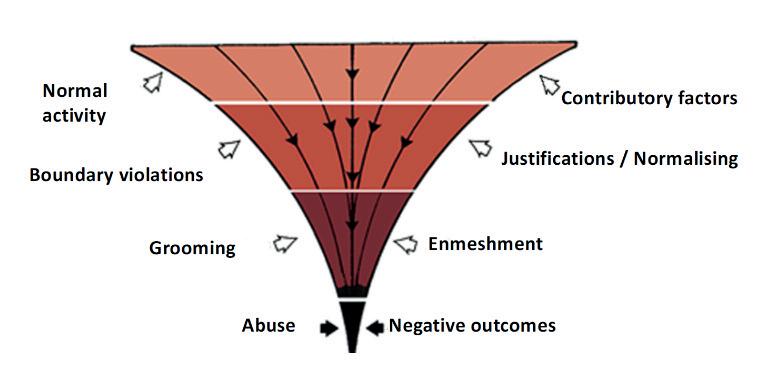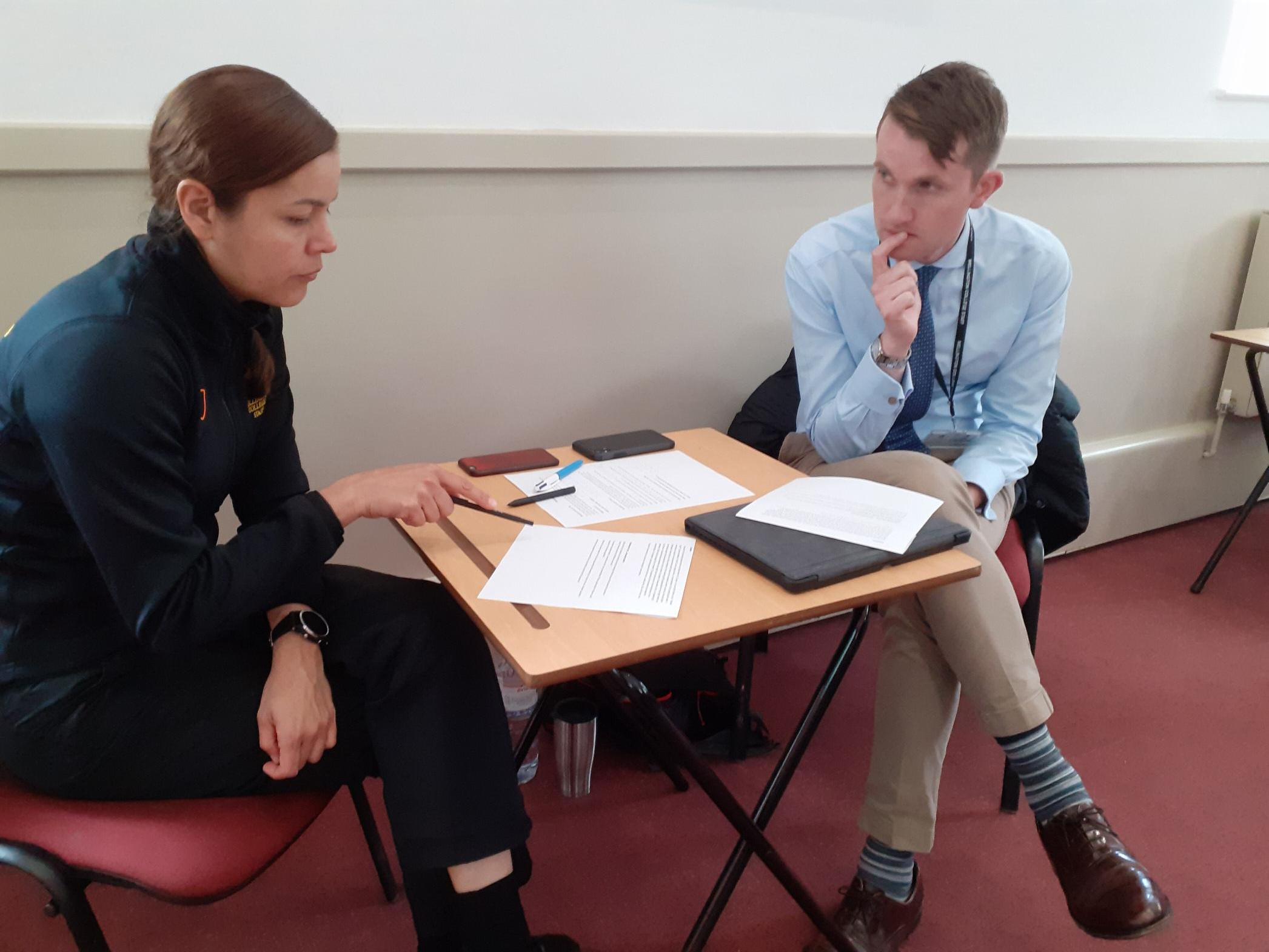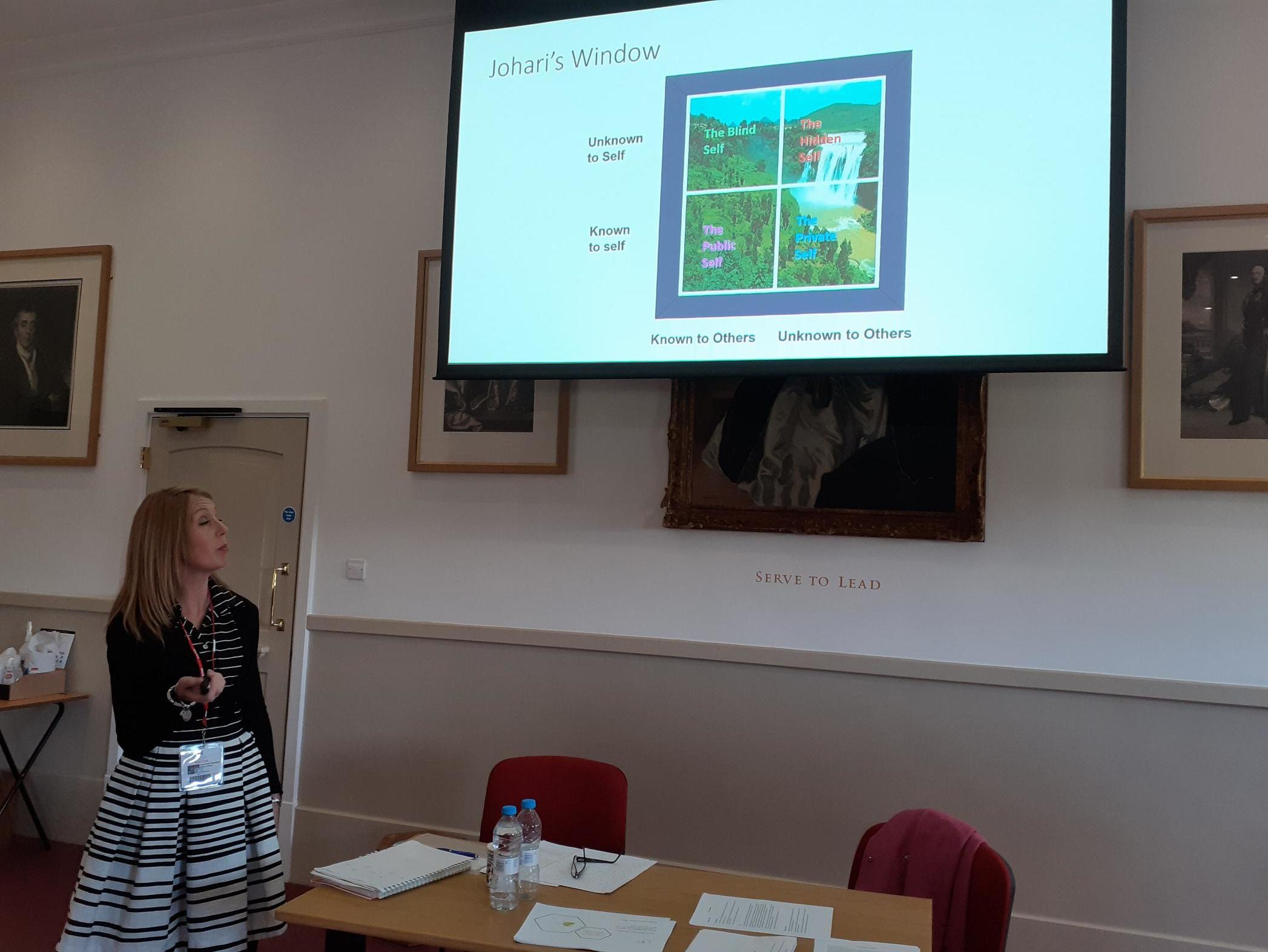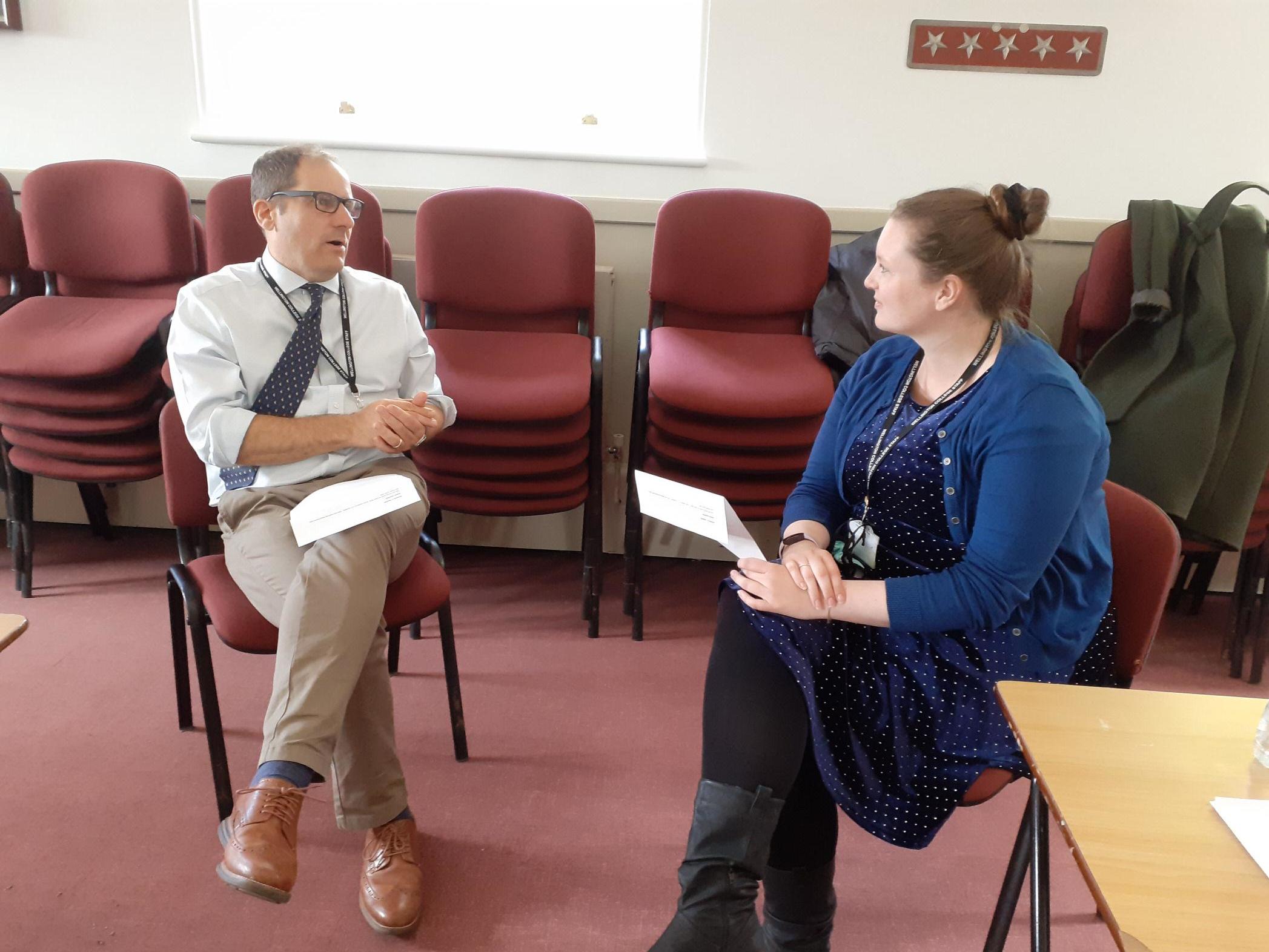
13 minute read
VBI AND LLC? THE ANACRONYMS OF A SAFER CULTURE WITHIN BOARDING SCHOOLS?
? VBI and LLC? The anacronyms of a safer culture within boarding schools?
Delyth Lynch Deputy Head (Safeguarding) and Mental Health Lead Wellington College
?In September 2010, I was one week into my new role as Deputy Head (Pastoral). A knock at the door and the words
“ can I speak to you about a teacher?” became a career defining moment and one which has shaped the safeguarding journey of the College over the last decade and initiated two strategies that have had a significant impact on the safeguarding culture at Wellington:Values and Attitudes Based Interviewing and Low Level Concerns.
1Kerry Cleary is a values based leadership, wellbeing and safeguarding facilitator, coach and trainer. She is the founder of VBA Consulting. 2Bichard, M. (2004), The Bichard Inquiry Report - An independent inquiry arising from the Soham murders. House of Commons: London, The Stationery Office 3Taylor, S. (2010) Resourcing and Talent Management. CIPD. In 2011, we commissioned the NSPCC to carry out an IMR (Independent Management Review) of our safeguarding procedures and policies. The only recommendation suggested us considering the adoption of Values Based Interviewing (VBI) when recruiting staff. I was curious and began working with consultant Kerry Cleary1 . Over a 9 month period an extensive scoping exercise was undertaken which involved speaking to large numbers of staff and students, examining the College’s 5 core values kindness, courage, integrity, responsibility and respect - and formulating a new recruitment plan which incorporated VBI. Key individuals were trained and the whole process trialled; we never looked back. Feedback from staff – those newly appointed and those who have served at Wellington for a long time – confirms that it has had a significant impact on the quality and integrity of the individuals we have employed. But what is it and how can it add to the safer recruitment procedure in a boarding school, thereby facilitating and promoting a safer culture within the school as a whole?
Following the Bichard Enquiry (2004)2 there was a heightened awareness of the need to ensure that processes for recruiting people to work with children can be as robust as can be. Values Based Interviewing (VBI) is a highly developed selection tool developed by the NSPCC and allows organisations to assess the alignment of individual and organisational values so that staff can be brought into the school who model the values and behaviours expected and, crucially, will take action if they do not see them enacted.
It is vital that a recruitment process in a boarding school considers an individual’s behaviour and their underlying motives and values in order to identify whether they are suitable to work with children who are vulnerable; they are living away from home, often in a different country and rely on trusted adults for their daily guidance and support. In my BSA Fellowship Report (2019) I also highlighted several other key factors which make boarding schools uniquely at risk to potential abuse by individuals. Research shows that interviews have a low predictive validity (0.2-0.3) (Taylor, 2010)3 signifying that they are not a good indication of how someone might perform once they are in a role. Using a number of different assessment tools as part of the interview process means that a candidate has various opportunities to demonstrate their behaviours in different settings; the advantage of this is that the picture built of an individual wishing to work in your boarding school has not been painted “by chance” and has been seen more than once. The inclusion of a VBI enhances this process by allowing the interviewers to get nearer to the true values, motives and attitudes of individuals but also seeks to draw out
information from a candidate’s ‘blind area’ – the area where candidates may be unaware of how they act in different situations and under different pressures. The Johari’s Window Model (Luft and Ingham, 1955)4 provides a useful pictorial illustration of these different facets of an individual’s persona. By using a VBI to facilitate the gathering of more in depth knowledge about someone who you are employing to work within the boarding environment, specific questions pertaining to the school’s values and ethos can be asked in order to gain evidence of past behaviour with children or colleagues; you can ascertain not only what they did but why they did it and how it impacted on them and others. It allows you to gain a unique insights into that person. Using Kerry’s expertise, we were able to create a more sophisticated interview approach which built on the core tenets of safer recruitment already in place. The College had, in 2010, undergone an extensive community exercise in creating a set of values which were reflective of the school and had collective ownership. These values were then used to provide a robust framework on which to develop interview questions and criteria. Since its introduction, the
process has been refined and has evolved but the core principles remain the same, and the interview model currently in place distinctly analyses the interaction between the College values, a candidate’s values and how the candida te would be expected to behave when employed. Working off the principle that past behaviour is the most accurate predictor of future behaviour, our bank of interview questions and assessment criteria are designed to draw out examples of past actions and using the SAFARI probing technique (Situation, Action, Feelings, Analysis, Results, Impact), information is gained about their behaviour, attitude and values. In terms of the Johari Window model, VBI allows exploration of both the hidden area by probing beneath what candidates initially present and also the blind area by as king candidates to re flect on their past behavio ur and its impact on others in a way tha t they have not have thought about or addres past. sed in the A practical 2 day training course has been developed in order to train staff in the proce ss thereby allowing a large organisatio n to sustainably opera te an additional la yer to the recr uitment procedure. Every potent ial new member of sta ff undergoe s a VBI and the results of the interview for m a vital part of the decision making process, being considered seriously alongside the competency and skills based interviews. Where the re have been potential stumbling blocks, we have s topped and looked logically at solutions because we believe so passionately in its value in protecting young people and adding to the overall culture of safegua rding wit hin the boarding env ironment. We
Johari Window Model
4Luft. J and Ingham, H (1995) ‘ The Johari Window, a graphic model of interpersonal awareness’ . Proceedings of the western training laboratory in group development. Los Angeles: UCLA
are undertaking an extensive review and evaluation of the process again this year, working with Kerry to look at our questions and outcome criteria and reconsider our structure for interviewer training and appraisal.
There are several key learning points should you be thinking about introducing VBI into your recruitment process:
• The process takes time – the work needs to be based on a well known and lived out set of organisational values of which the whole community have a collective ownership. These values need to have relevance for all staff and their job roles. Considerable time and thought needs to be given to creating relevant question banks and outcome criteria to ensure a consistency of approach
• Everyone needs to understand the
‘ why ’ – there needs to be understanding and buy in from Senior Leaders and particularly middle leaders who may be responsible for the recruitment of staff into their departments or houses. Creating a safer culture within a boarding school really does start at the very beginning of the recruitment process and all staff need to be acutely aware of this
• Interviewers with the right skills need to be identified – they also need to be given time and continual training to continue to develop their skills
• Brief applicants – interview candidates needs to be briefed in advance of their interview as to what aVBI is and what is expected.This also adds an additional layer of safeguarding – a potential abuser may well be put off applying to a boarding school which clearly and openly places safeguarding at the centre of everything they do and which starts at the very beginning in the recruitment phase
• A VBI policy needs to be written – be clear on lines of accountability, ownership of the process and what should be done if an interviewee performs below your expectations in theVBI but strongly in other areas
The second part of this piece for the College, however, was how we encouraged our staff to “take action” if they were not seeing the values modelled or enacted by their colleagues in any aspect of their work or general conduct. Having become fascinated by the work of Marcus Erooga, I attended a seminar that he delivered in conjunction with Farrer & Co. They were beginning to develop language around the concept of ‘low level concerns’ and highlight the importance of capturing these in some way. This seemed to be inextricably linked to the work we were undertaking with VBIs and totally aligned with the safeguarding culture we wanted to be lived out within the College. A key aspect of the dynamics of institutional child sexual abuse was the behaviour of the institution itself with regards its response to any disclosures or “niggles” that staff – or students – might have about an individual. Often, colleagues who may have a suspicion about an individual find it impossible to believe that anything ‘untoward’ may be happening and serious case reviews that had been undertaken in school settings also highlighted that disclosures had been frequently met with ‘staff denial’ . It struck me that within a boarding school, this idea of denial when considered alongside the unique set of characteristics that almost all boarding school staff display (passionate about the well-being of children, working long hours, supporting children away from their homes, living on site) could , almost tacitly, prevent or erode a positive safeguarding culture within a boarding school. In effect, the organisation itself would have a ‘blind area’ .
Group norms in a boarding school can become so engrained that to challenge them can be enormously personally and professionally threatening. When conversations may be happening over a pint in the staff social club or local pub, inhibitions and morals may be lowered and boundaries blurred, resulting in organisational puns and innuendo which further constructs a mo re closed organisational cult ure; professional boundaries become confused and - more dangerously accepted. Such a culture can begin to endorse assumptions, values, be liefs, and norms that may cast wrongdoing in a positive light or validate techniques of neutralisation stipulate extenuating circum that stances in which wrongdoing can be considered acceptable. The ‘slippery slope’ Erooga’s ‘slippery slope’ model5 illustrates this brilliantly. A potential abuser could cleverly manipulate the boarding school setting to violate simple, seemingly inc onsequential boundaries within the school. They are checking to see what the response might be and whether a ‘blind eye’ is being turned. In essence, they are taking a temperature check of the culture within that organisation. When 5Erooga, M (ed) (2018) Protecting Children and Adults from Abuse After Savile: What Organisations and Institutions Need to do (Jessica Kingsley Publishers) London and Philadelphia

expressed as a model, it can be seen that the increasingly steep sides of the slope make it more likely that, without intervention, an individual may progress from a relatively innocent boundary violation to more serious behaviour indiscretions and, ultimately, abuse.
Having a way in which low level concerns were understood and thereby facilitating an open culture around self reporting and being able to express concerns about others especially when no particular threshold had been met seemed obvious – but highly challenging. Initially, we built up a dialogue in this area and a powerful and moving talk by Katie Rigg (Farrer & Co) in 2014 stimulated a collective curiosity in the staff. Those who were interested (or sceptical!) formed a working group to look at the formulation of a low level concerns policy, using the expertise of Katie to frame their thoughts and put into words their expectations. One individual stated in a meeting “we need something which allows the behaviours of staff which do not cross a particular threshold to be challenged in a supportive way…..but in a way in which the individual – and those around them – knows it has been noticed. The policy has now been in place for almost 6 years; initially it did much to unlock the whole area of honesty and trust – for the benefit of safeguarding. It gave a lexicon on which to frame a potentially difficult conversation –conversations which may, in the past, have been avoided and therefore behaviours gone unnoticed. Annually, the sharing of low level concerns and self reporting has increased; it has become easier for colleagues to discuss their observations or “niggles” within a culture where they know they will be listened to, where appropriate and helpful advice will be given and that they know they are being taken

seriously. The policy has effectively enabled us to capture behaviours and actions before they escalate and these have been issues which – in almost all cases – would not have crossed a “safeguarding threshold” . The resultant effect has been increased professionalism across the board and a willingness and openness to seek help and to help others.
For the first time, the consultation document for KCSIE 2021 drew attention to the idea of organisational safeguarding culture by including a section on low level concerns about staff. It moots the idea that schools and Colleges should have guidance which provides advice on procedures handling concerns that do not meet a threshold. Watch this space and do consult Farrer & Co’s superb guidance
(https://www.farrer.co.uk/globalass ets/clients-and-sectors/safeguarding /low-level-concerns-guidance-
2020.pdf) which provides the blueprint and benchmark for the introduction and implementation of such a policy.
As a result of our low level concerns policy, Wellington also introduced a group of ‘listening staff’ known as ‘Values Guardians’ . These are a group of specially selected and trained staff who offer an additional layer of listening support to help individuals feel more confident about sharing their concerns about a member of staff; this could be about their conduct and it not being aligned to the College values or simply about their general welfare. Each new member of staff is assigned a Values Guardian Buddy who explains the low level concerns policy and its importance as a supportive process which is a key part of keeping the children safe at the College. The effect of this one-to-one conversation which is tailored to the member of staff’s role is invaluable and ensures that there is an on-going dialogue around

safeguarding that everyone “gets” and wants to be a part of.
Priorities in the world of safegarding change constantly.What will never be in doubt is that achieving effective safeguarding is intrinsically linked to the creation, implementation and continous strengthenening of a safeguarding culture within a boarding school. Staff need to buy into it and believe in it; they then need to live and breathe it so that our schools can be as safe as possible, because that is what our young people deserve and have a right to.
Delyth Lynch
Deputy Head (Safeguarding) and Mental Health Lead, Wellington College
Delyth has been on the Senior Leadership Team at Wellington College for 11 years. In 2018 she was awarded the BSA Research Fellowship conducting her research on ‘Abuse in Boarding Schools, probing into an area where there was little research or literature available. Her paper won the National Research Award (2019) and has received much interest from others in the field, with her findings being cited at the recent IICSA inquiry.








